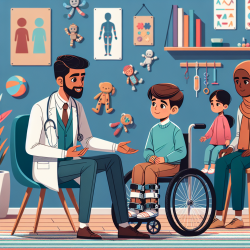As a practitioner working with individuals who have neurodevelopmental disorders such as acquired brain injury (ABI), cerebral palsy (CP), and spina bifida (SB), understanding effective psychological interventions is crucial. A recent scoping review titled "Psychological Interventions for Individuals With Acquired Brain Injury, Cerebral Palsy, and Spina Bifida: A Scoping Review" provides valuable insights into the current state of research in this area. This blog post will summarize the key findings of the review and offer guidance on how practitioners can enhance their skills to improve patient outcomes.
The Need for Psychological Interventions
Individuals with CP, SB, and childhood onset ABI often face significant mental health challenges. These can include anxiety, depression, and low self-esteem, which are exacerbated during the transition from child- to adult-centered healthcare services. The review highlights the importance of offering evidence-based psychological interventions to address these challenges and facilitate smoother transitions.
Key Findings from the Scoping Review
The scoping review identified several psychological interventions that have been evaluated for effectiveness in treating mental health difficulties in individuals with CP and ABI. Unfortunately, no studies were found specifically addressing SB. The most commonly reported interventions were:
- Cognitive Behavioral Therapy (CBT): Effective in reducing depressive symptoms, anxiety levels, and behavioral problems.
- Acceptance and Commitment Therapy (ACT): Improved mood and psychological outcomes by decreasing avoidance of thoughts and emotions.
- Psychotherapy: Subjectively reported to improve mental health outcomes by helping individuals process past traumas and integrate body image with self-identity.
Implementing Research Outcomes in Practice
Practitioners can enhance their skills by integrating these evidence-based interventions into their practice. Here are some actionable steps:
- Stay Informed: Regularly attend conferences and webinars to keep up-to-date with the latest research findings and therapy techniques.
- Personalize Interventions: Tailor therapy sessions to meet the unique needs of each individual. Consider factors such as the severity of symptoms, personal preferences, and family involvement.
- Incorporate Technology: Utilize online platforms for delivering therapy sessions when face-to-face interactions are not possible. This approach can increase accessibility for individuals with mobility challenges.
- Collaborate with Peers: Engage in networking opportunities to share experiences and learn from other practitioners who specialize in neurodevelopmental disorders.
The Importance of Further Research
The review underscores the need for more research into psychological interventions for individuals with SB and various types of ABIs. Practitioners are encouraged to contribute to this growing body of knowledge by participating in research studies or conducting their own investigations. By expanding our understanding of effective interventions, we can continue to improve mental health outcomes for these populations.
Conclusion
The findings from this scoping review provide a foundation for enhancing practitioner skills through the implementation of evidence-based psychological interventions. By staying informed, personalizing therapy sessions, incorporating technology, and collaborating with peers, practitioners can significantly improve the mental health outcomes of individuals with CP, ABI, and potentially SB. Continued research is essential to fill existing gaps and ensure that all individuals receive the support they need during critical transition periods.
To read the original research paper, please follow this link: Psychological Interventions for Individuals With Acquired Brain Injury, Cerebral Palsy, and Spina Bifida: A Scoping Review.










